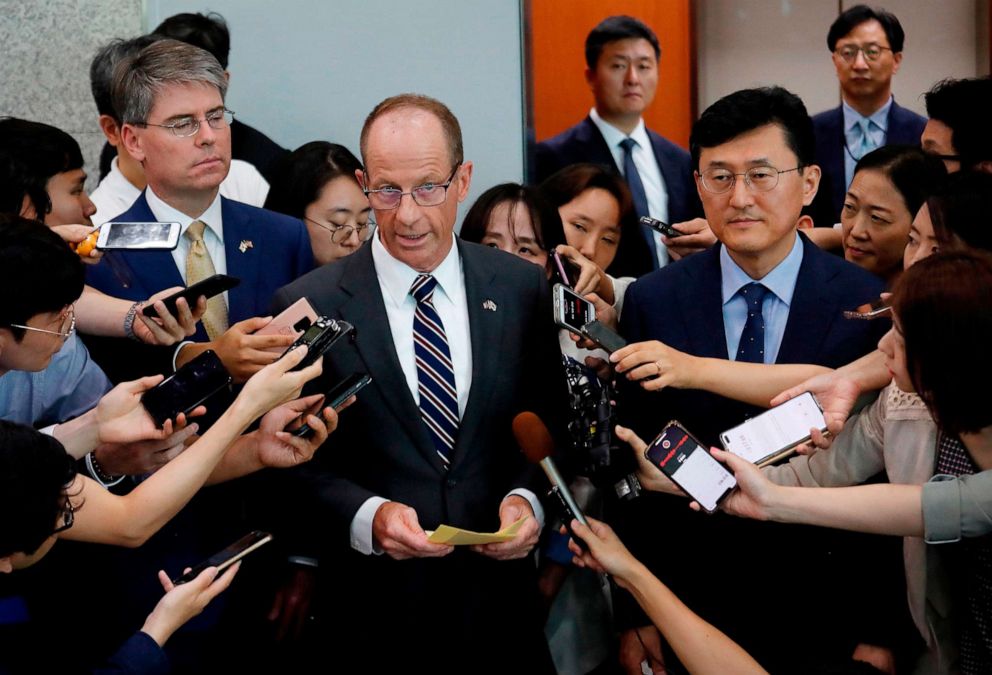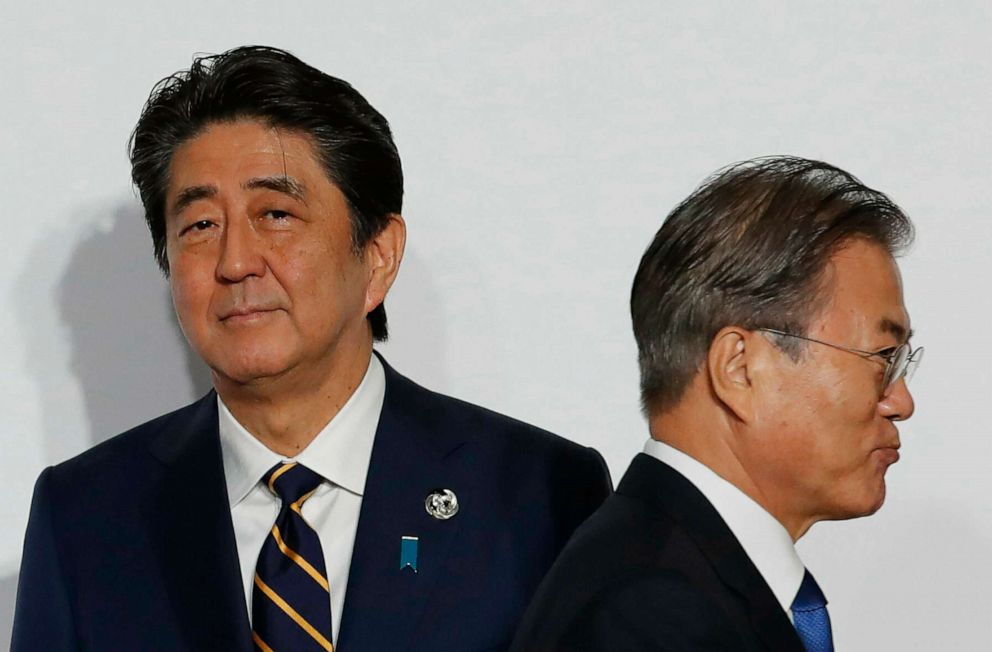South Korea and Japan trade dispute could lead to 'dire consequences,' official warns
Japan announced tighter curbs on chemical materials exported to South Korea.
SEOUL, South Korea -- A thorny trade dispute between South Korea and Japan could end up with "dire consequences" and "adversely affect companies like Apple, Amazon, Dell, Sony, and billions of consumers all over the world," a senior South Korean government official told foreign reporters in Seoul on Wednesday.
The official slammed the Japanese government for undermining principles of free trade and warned that if the latest export curbs against South Korea continues, "the global value chain will crumble."
Japan, in a surprise move, announced July 1 that it will implement tighter export curbs on essential chemical materials exported to South Korea. The materials – fluorinated polyamides, photoresists and hydrogen fluoride – are mostly imported by Samsung Electronics and SK Hynix to produce memory chips, displays and next-generation semiconductors. Semiconductors take up some 25% of Korea's exports.
Seoul hopes Washington would mediate
South Korea, the world's leading semiconductor manufacturer, was caught off guard by the move and hopes that the U.S. would mediate the dispute as the three allies face other political challenges in the region against China and North Korea, according to reports.

David Stilwell, new U.S. Assistant Secretary of State for East Asian and Pacific Affairs, told reporters the U.S. "sufficiently understood the seriousness of the issue" and recognized that the two allies of the United States must work together.
"The truth is, no significant issue in this region can be resolved without cooperation between our two allies," said Stilwell after a series of meetings with top government officials in Seoul Wednesday.
Domino effect on global industries
Unlike trade of finished goods, high-tech industry goods that are sourced globally are interdependent. Countries that rely on South Korea's semiconductors such as United States, China and even Japan will all be adversely affected, analysts say, causing a domino effect on the global supply chain in computer and smartphone industries.
"In the worst case scenario, if an export of chemical materials such as etching gas (hydrogen fluoride) is restricted, Samsung factories cannot operate normally. That will subsequently affect the export of manufactured semiconductors from South Korea to China as well as to Japan. It will also be difficult for Chinese end-products to be delivered to the United States and Japan," Kim Hyun-Chul, an expert on Japanese enterprise at Seoul National University, told ABC News.
"U.S. electronics firms, many of which have large production hubs in both the U.S. and China, are vulnerable to supply shortages of South Korean memory chips, given the importance of South Korea as a supplier of chips to both China and the U.S.," Rajiv Biswas, Asia-Pacific chief economist at IHS Markit, told ABC News.
It's not only hardware such as mobile phones and electronic products but also data processing programs that would face supply shortage or delay.
"Memory semiconductor is an integral part of data processing center operated by global IT companies like Google and Amazon," Kim Yang Paeng, research fellow at the Korea Institute for Industrial Economics and Trade, told ABC News.
History shadows politics
Japan's sudden exports curb on chemical products going to South Korea stemmed from a decades-long dispute between the two countries over Japan's atrocities during the occupation years from 1910 to 1945, namely controversial issues of "comfort women" and wartime forced labor.
South Korea's Supreme Court ruled last October and November that Nippon Steel & Sumitomo Metal Corp. and Mitsubishi Heavy Industries must compensate Korean victims of wartime forced labor.
But Japan disputes the ruling, saying all reparations had already been settled in a 1965 treaty that normalized relations between the two countries.
"We cannot help but say the relationship of trust has been severely damaged," Japan's Chief Cabinet Secretary Suga told reporters in early July.

Three days later, another Tokyo official, Koichi Hagiuda, a senior member of Japan's ruling Liberal Democratic Party, threw a second punch at flabbergasted Seoul by claiming the restrictions were prompted by concerns that one of the three restricted chemical materials, etching gas, might be flowing into North Korea and could be used to produce chemical weapons. Hagiuda said there was "inadequate management" of sensitive items and a lack of information sharing on export controls.
Japan then took back the accusations last Friday, stating that its decision to impose restrictions on the export of high-tech materials to South Korea has nothing to do with North Korea.
South Korean President Moon Jae-in, who has put work into North Korea affairs since taking office, fired back loud and clear in a speech saying the accusations pose a "grave challenge" and Seoul has undoubtedly been "complying with UN Security Council resolutions and working within the sanctions framework."
Seoul hopes for diplomatic solution
"We should remember that science and technology is not a tool for war, which will only lead to tragic consequences," said the senior level South Korean government official. The two countries should resolve the "historical matters" in a constructive manner by dialogue and diplomatic negotiations and Seoul "will try to exercise flexibility," he said.
South Korea is contemplating the idea of resolving the issue through the Geneva-based World Trade Organization, but in reality, even the senior official admits that process will take years, after which it would be too late for Samsung Electronics and SK Hynix with only a few months worth of stockpiles left for production.
The topic is now formally included as the final agenda item at a two-day meeting of the WTO Council for Trade in Goods next week, Yonhap News reported.
ABC News' Hakyung Kate Lee, Hansol Park and Sorah Choi contributed to this report.




